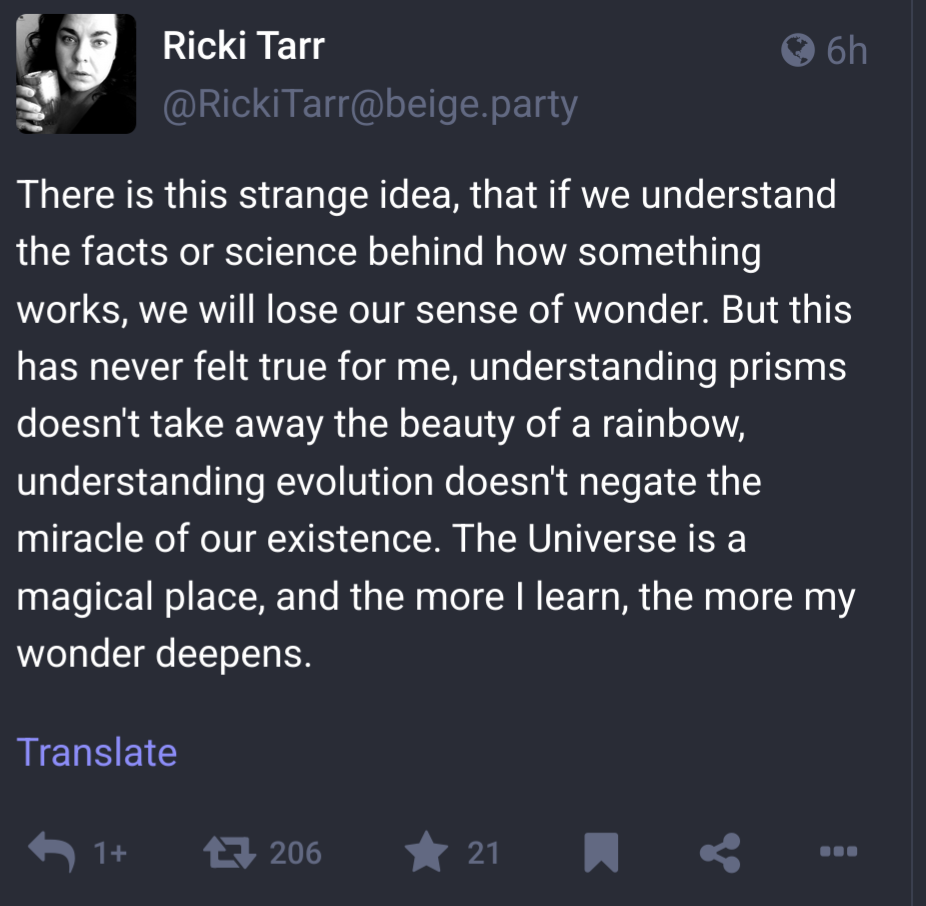this post was submitted on 13 Sep 2023
412 points (98.1% liked)
Microblog Memes
6023 readers
1930 users here now
A place to share screenshots of Microblog posts, whether from Mastodon, tumblr, ~~Twitter~~ X, KBin, Threads or elsewhere.
Created as an evolution of White People Twitter and other tweet-capture subreddits.
Rules:
- Please put at least one word relevant to the post in the post title.
- Be nice.
- No advertising, brand promotion or guerilla marketing.
- Posters are encouraged to link to the toot or tweet etc in the description of posts.
Related communities:
founded 1 year ago
MODERATORS
you are viewing a single comment's thread
view the rest of the comments
view the rest of the comments

As someone who went to art school, a fairly common view that artists have is that they have a unique view of the world and can see it in a way others cannot. Maybe that's true, but then the thinking goes that the way others see the world is inferior, and I think there's nothing further from the truth than that. Everyone sees beauty in different ways.
Too many artists perceived the world in us vs them terms. Art or science. Too this I say: da Vinci. He considered himself an engineer, not an artist but married both in a fascinating way.
(Educated in fine arts myself, but damn if I don't love science, logic and even a good snippet of code every now and then)
I’m not educated in fine arts. As a scientist, my biggest criticism of artists (particularly those with formal education) is when they insist that the art is contained within the mind of the person viewing it.
There were two sentences that completely transformed my appreciation of modern art (and I’m using that as a very general, layman’s version of the term). The first was “liberating paint from representationalism.” The idea that you could explore visual dimensions in color, shading, geometry, texture and so on without having to make it look like people at a picnic was really interesting to me. That there was a very deliberative and exploratory side to applying paint to canvas for some reason never really occurred to me, even though I studied literature in addition to science and had been developing a sense of the craft of prose and poetry.
The second was a statement from Jackson Pollock on his transformation from realism to abstract art. During the Depression (I know you know this, but I’m clarifying my experience of understanding), Pollock painted in a style I believe is called social realism. A lot of the art done via WPA (the depression-era government work program) showed average people living their lives and doing their jobs. Without getting too deeply into it, that was the aesthetic. After WWII, Pollock said something along the lines of representationalism having no place in a world with nuclear weapons. It was a horror beyond the ability of an artist to depict. He moved into non-representational works as a result. As someone who (at the time) was working in the defense industry with strategic weapons systems and plans, that also really resonated with me.
My point is that without those and other, later insights from people educated in art and art history, I’d have no framework for appreciation. It’s like reading Shakespeare with no knowledge of literature. At best, you can get a surface level of appreciation based on what you’ve seen in movies or read in modern novels, but there’s a vast dimensionality that you’re simply not equipped to notice.
When we see a flower or the exotic plumage of a bird, we can only see what evolution has equipped us to see. Other than the cases where we as humans have taken over the role of natural selection and started breeding for our own aesthetic purposes, we don’t generally realize that those beautiful things have evolved for reasons completely apart from what we see, and that they might look completely different to the species they evolved for.
I actually like it when someone with an arts background can take a painting I like and tell me why it’s a cringe-filled collection of tropes. I might even continue to like it, but I do want to know I’m looking at Goosebumps and not War and Peace.
Thank you and everyone else that contributed to such a lovely comment chain. I had a great time and learned new things but I also really appreciated your respectful and different perspectives. Art really does bring us together doesn't it?
Da Vinci is a great example. There is science in art, and art in science.
And there is art in fart
You can't spell fart without it!
Science 1, art 0.